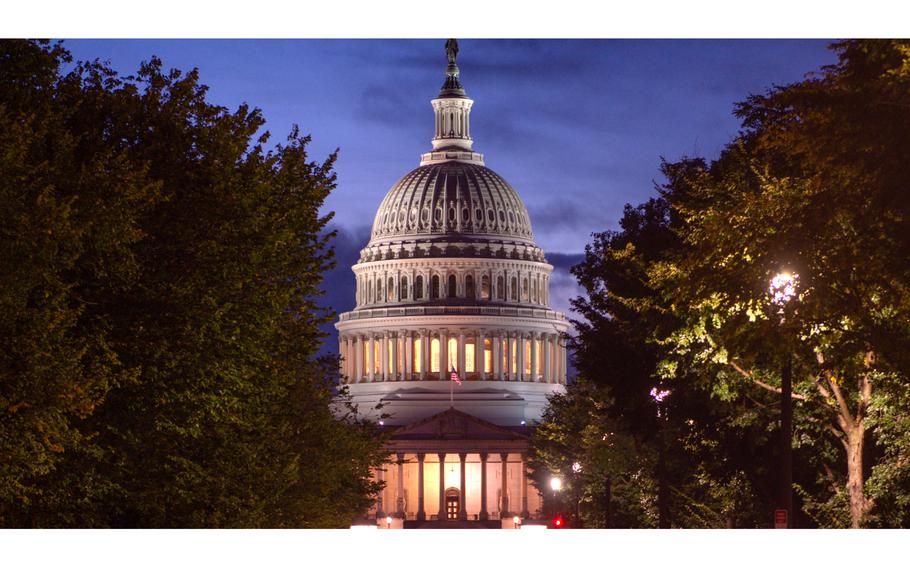
The U.S. House of Representatives’ recent passage of the One Big Beautiful Bill Act (H.R. 1) marks a big step toward rolling back discriminatory regulations that stifle higher education competition and student choice, especially for military and veteran students. Now the Senate can finalize these regulatory reforms in the budget reconciliation bill that will be sent to President Donald Trump’s desk. (Carlos Bongioanni/Stars and Stripes)
The U.S. House of Representatives’ recent passage of the One Big Beautiful Bill Act (H.R. 1) marks a big step toward rolling back discriminatory regulations that stifle higher education competition and student choice, especially for military and veteran students.
The House’s reconciliation bill includes language developed by the House Education & the Workforce Committee that would repeal the 90/10 and Gainful Employment rules — a killer regulatory combo the Department of Education leveraged under the past administration specifically to target career-education institutions and online programs. These rules tipped the education market in favor of traditional public, private and state-run colleges and universities, making it harder for students (particularly military and veteran students) to choose the education systems and programs that work best for them.
Unfortunately, the Senate’s version of the bill, in its current form, would leave these regulations in place, effectively reinforcing the status quo. Senate leaders would be wise to keep the House’s language and repeal these biased rules while the window of opportunity is open.
The 90/10 and Gainful Employment rules — which apply exclusively to non-traditional educational institutions — were never intended to protect student interests. They were designed as a cudgel to drive career colleges and programs that offer an alternative to the higher ed cartel out of business.
One analysis found that about 40% of programs at private colleges and universities and 30% of those at public schools would fail the Department of Education’s Gainful Employment test. If regulators are so concerned about making sure students aren’t duped by these supposedly evil non-traditional educators, why not apply the same standard uniformly across all colleges and universities?
A majority of Americans no longer believe a four-year degree is worth the cost. Yet, the Department of Education previously insisted on singling out career-education institutions, even though they represent only about one in 10 U.S. college students. And despite the deck being stacked against these schools, they continue to grow in popularity — especially among veteran and non-traditional students.
Similarly, the department’s 90/10 rule prohibits career colleges from counting revenue from distance education programs toward the 10% side of their ledger that must come from non-federal aid. The stipulation itself was an error. Online program revenue was not discussed in the context of the 90/10 Rule during the negotiated rulemaking hearing, but somehow it found its way into the regulation’s preamble and was adopted as doctrine by the Education Department.
Rep. Burgess Owens, R-Utah, a good friend and tireless advocate for military and veteran student choice, introduced legislation this year to correct the 90/10 preamble and “level the playing field” for colleges and universities to compete. He makes a great point: “It doesn’t matter what the institution is — as long as it’s getting results and is merit-based, we should be supporting it.”
Education Secretary Linda McMahon can correct these contorted regulatory gymnastics the previous administration manipulated when they “amended” the preamble of the previously finalized and published regulation — which was never discussed during the Negotiated Rulemaking process that requires concurrence of the rulemaking committee. And fortunately, there appears to be the will to do so. In a recent memo McMahon noted “millions of young Americans are trapped in failing schools” and pledged to “eliminate unnecessary bureaucracy” so colleges and students can thrive.
As I testified before a Department of Education negotiated rulemaking committee, federal bureaucrats shouldn’t dictate how and where veterans and military personnel can use their earned education benefits. America entrusts our military leaders with the lives of its sons and daughters during service. But it doesn’t trust them to choose a college or program that best meets their learning needs, and that is fundamentally unfair.
After years of vindictive regulation and double standards, the 119th Congress and the Department of Education now are approaching these issues logically, fairly, and with the interests of the student first and foremost in their approach — not the interests of entrenched traditional institutions who want the Department of Education to rig the system to protect their market share from competition. The establishment will try to fight them, and it’s already dug in. But we owe it to our military and veterans — and all students — to restore a regulatory framework that fosters choice, competition and innovation.
Bob “Shoebob” Carey, a retired U.S. Navy captain, is executive director of the National Defense Committee, a veterans organization dedicated to military and veterans civil and legal rights. He’s worked for several veteran and military advocacy organizations, served as a member of the Senior Executive Service in both the departments of Defense and Energy, and was a national security adviser to two U.S. senators.